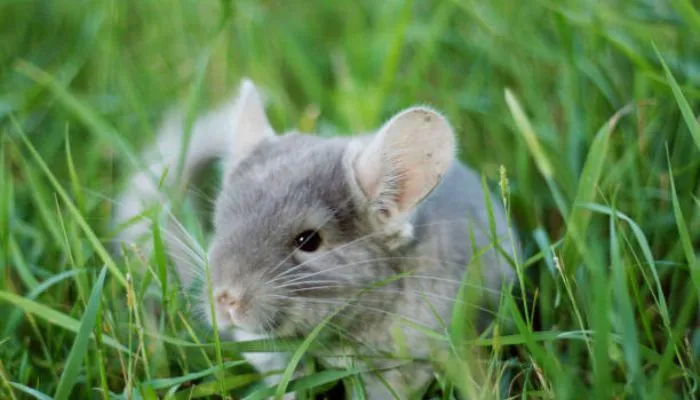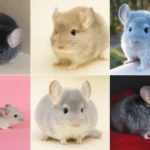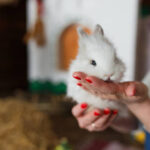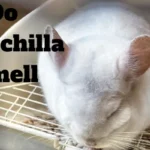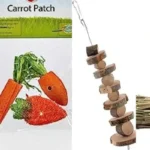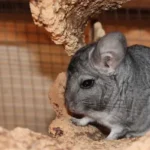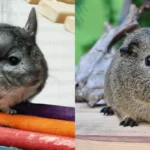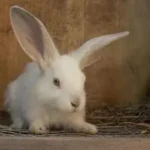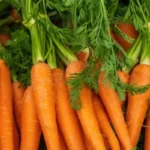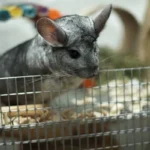Chinchillas, with their velvety fur and lively personalities, has captured the hearts of many pet lovers. But when it comes to their diet, questions often arise, one of them being, “Can chinchillas eat rabbit food?” It’s a question that might have come to your mind if you’re a chinchilla owner or considering these charming, fur-covered companions as your next pet. Chinchillas, with their soft, plush fur and lively personalities, capture the hearts of many animal lovers. But their health, much like any other pet, relies on their diet. In this article, I will completely guide you about whether it’s safe and healthy for chinchillas to munch on rabbit food. So, if you’re a chinchilla owner or just curious about these furry little pals, let’s find out if rabbit food is a friend or foe for your chinchilla’s diet.
Chinchilla Dietary Requirements:
Chinchillas have specific dietary needs. Just like us, they need a balanced diet to stay in good shape. Their ideal meal consists of high-fiber, low-fat foods. “Can chinchillas eat rabbit food?” These little guys require plenty of hay, like timothy hay, to keep their digestive systems running smoothly. Fresh water is a must, too.
1- Fiber-Rich Diet:
Chinchillas are herbivores, and their digestive systems thrive on a diet that’s high in fiber. Fiber aids in digestion, preventing issues like constipation and bloat. Timothy hay, in particular, is a staple in their diet as it provides the necessary fiber.
2- Low-Fat, Low-Sugar Diet:
Maintaining a low-fat and low-sugar diet is crucial for chinchillas. High-fat or sugary foods can lead to health problems, including obesity and diabetes. It’s essential to provide them with foods that are low in both fat and sugar content.
3- Fresh Water:
Proper hydration is key to a chinchilla’s well-being. Fresh, clean water should always be available for them. Dehydration can lead to various health issues, so ensuring they have access to water is vital.
Rabbit Food Composition:
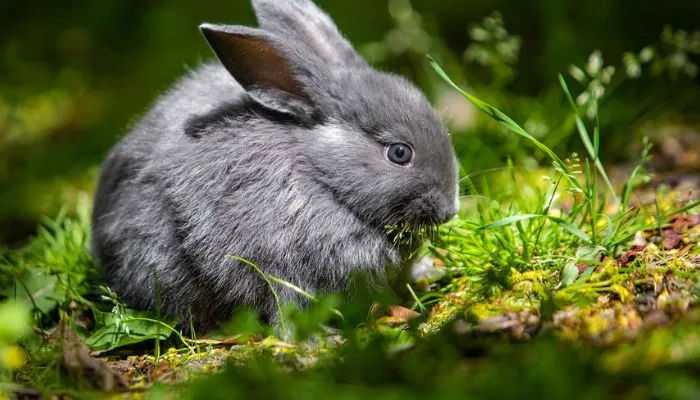
Rabbit food typically contains a mix of various grains and seeds. But here’s the thing: while rabbits and chinchillas might seem similar, their dietary requirements are quite different. Chinchillas need less fat and protein, and more fiber.
- Grains and Seeds: Rabbit food commonly includes a mixture of grains like wheat, barley, oats, and seeds such as sunflower seeds. These components are designed to provide a source of energy and some essential nutrients for rabbits.
- Pellets: In addition to grains and seeds, rabbit food often includes compressed pellets. These pellets are formulated to offer a concentrated source of nutrition, including vitamins and minerals, to support the overall health of rabbits.
Why Rabbit Food is Bad for My Chinchilla?
1- Digestion:
Chinchillas have pretty delicate stomachs, and their digestive systems are designed for a high-fiber diet. They love munching on timothy hay, which helps keep their digestion running smoothly. Rabbit food, however, may contain ingredients that are too rich for their tummies. This can lead to digestive problems, making it important to be cautious about what you feed them.
2- Overeating:
Chinchillas are notorious for their love of food. If they have access to a tasty, high-fat, and sugary diet like rabbit food, they might overindulge. Overeating can lead to obesity, which is not good for their health. So, we need to ensure that they don’t feast on food that’s too rich for them.
3- Dental Health:
Chinchillas have teeth that grow continuously. To keep those chompers in check, they need to chew on fibrous materials. Rabbit food, with its concentrated nutrients, might not be as effective in promoting dental health. Neglecting their dental care can lead to dental problems, which isn’t fun for them. So, to keep your chinchilla healthy, it’s best to stick to the right foods. Rabbit food might be good for rabbits, but for chinchillas, it’s better to give them what they need to keep their tummies happy, avoid getting chubby, and maintain their teeth in top condition. Just like we eat our veggies for a strong and healthy body, chinchillas have their special diet for a happy and lively life!
Foods That Are Good For Chinchillas:
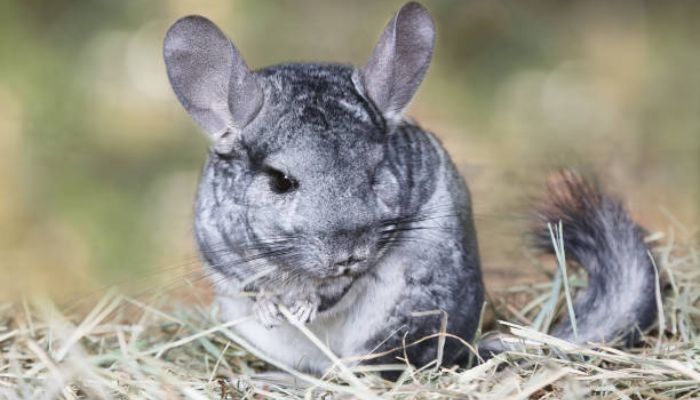
Now that we’ve talked about why rabbit food isn’t the best for chinchillas, let’s shift our focus to the foods that are great for them. Here are some healthy options that will keep your chinchilla feeling fantastic:
1- Timothy Hay:
Timothy Hay is like the favorite food of a chinchilla’s diet. It’s high in fiber, low in fat, and perfect for keeping their teeth healthy. Chinchillas love munching on it, so make sure they have a never-ending supply of timothy hay. It’s like their favorite snack!
2- Alfalfa Hay:
Alfalfa hay is another option, especially for young chinchillas and pregnant or nursing ones. It’s a bit richer, so it’s like a special treat for them. But remember, once they’re all grown up, it’s best to stick to the timothy hay for their daily meals.
3- Fresh Greens:
Just like you enjoy fresh fruits and veggies, chinchillas can have a taste of them too. Think of it as their version of a delicious salad. Kale, spinach, and carrots are some of their favorites. But remember, don’t go overboard with the greens. A small amount here and there is perfect.
4- Chinchilla Pellets:
Chinchilla pellets are specially designed to provide your chinchilla with the right mix of nutrients. It’s like their daily vitamins, ensuring they get everything they need to stay healthy.
5- Other Foods in Tiny Quantities:
Chinchillas can enjoy tiny bits of fruits, like apples and grapes, as a special treat. Think of it as giving them a piece of candy, but only once in a while. Additionally, safe wooden toys are a great option for them to chew on. It’s like giving them a fun snack and helping them keep their teeth in healthy condition.
How Can I Feed My Chinchilla Rabbit Food?
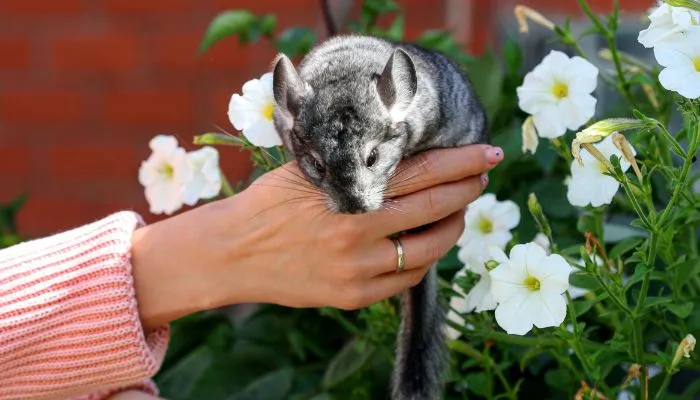
Feeding your chinchilla rabbit food might not be the best idea due to the specific dietary needs of chinchillas. However, if you want to transition them onto a different type of food, like chinchilla pellets or a balanced chinchilla diet, here’s how you can make the change:
1- Gradual Transition:
Chinchillas can be sensitive to sudden diet changes. To switch from rabbit food to chinchilla-appropriate food, you should do it gradually. Start by mixing a small amount of the new chinchilla food with the rabbit food. Over a week or two, increase the proportion of chinchilla food while decreasing the rabbit food until your chinchilla is eating only the recommended chinchilla diet.
2- Provide Fresh Hay:
Fresh hay is a crucial part of a chinchilla’s diet. Even during the transition, ensure that your chinchilla has access to a steady supply of fresh timothy hay. This will help with their digestion and provide comfort during the dietary change.
3- Fresh Water:
Always make sure your chinchilla has access to clean, fresh water. Proper hydration is essential for their health, so keep their water bottle filled and clean.
4- Monitor Their Health:
Throughout the transition, keep a close eye on your chinchilla’s health. Check for any signs of digestive issues or changes in behavior. If you notice any problems, consult a veterinarian who is knowledgeable about chinchilla care. Remember that rabbit food should not become a long-term part of your chinchilla’s diet. The ultimate goal is to transition them to a diet that’s specifically formulated for chinchillas, as outlined in the previous sections. This will ensure they receive the right nutrients to stay healthy and happy.
Are Any Rabbits Foods Safe For Chinchillas?
While chinchillas have specific dietary requirements that differ from those of rabbits, some rabbit foods might be safe for chinchillas in very limited quantities. Here are a few examples of safe rabbit foods that can be given to chinchillas as an occasional treat:
- Oats: Plain, uncooked oats are low in fat and can be offered in small quantities. Oats can provide a little variety to your chinchilla’s diet as an occasional treat.
- Barley: Barley is another grain that can be given to chinchillas sparingly. Just make sure it’s plain and uncooked.
- Dandelion Greens: Fresh dandelion greens are a safe option as an occasional addition to their diet. They are a source of essential nutrients and can be a tasty treat for chinchillas.
- Herbs: Some chinchillas enjoy small amounts of fresh herbs like cilantro, basil, or parsley. These can be given in moderation and can add some variety to their diet.
- Apple or Pear (without seeds): Chinchillas can have a tiny slice of apple or pear as a rare treat. Just make sure to remove the seeds as they can be harmful.
Remember that these foods should be offered infrequently and in very small quantities. Chinchillas have sensitive digestive systems, so it’s essential to avoid overfeeding them with foods that are not part of their regular diet. The majority of their nutrition should come from chinchilla-specific food, like timothy hay, chinchilla pellets, and fresh water. Always consult with a veterinarian experienced in chinchilla care before introducing any new foods to your chinchilla’s diet.
Conclusions:
So, can chinchillas eat rabbit food? After all we’ve explored, it’s advisable to be cautious and avoid offering rabbit food to your chinchilla. Opting for a diet of timothy hay, chinchilla pellets, and the occasional treat is the best way to ensure your fluffy friend remains happy and healthy. Your chinchilla relies on you for proper care, and their dietary choices play a significant role in their overall well-being. So, when those big, adorable eyes gaze at you, remember to provide the best nutrition possible. Your chinchilla will show its appreciation through its boundless energy and playful demeanor.
